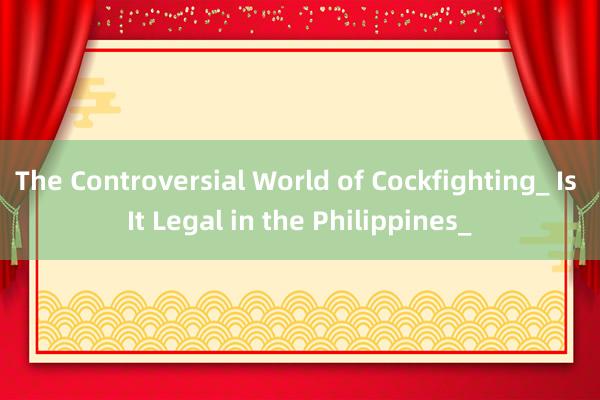

Cockfighting, a centuries-old tradition in the Philippines, is a topic of heated debate. This article explores the legal status of cockfighting in the Philippines, the cultural significance of the practice, and the ongoing discussions surrounding animal welfare and regulation.
Cockfighting, Philippines, animal welfare, legal status, tradition, regulation
Cockfighting has a long and storied history in the Philippines, woven into the very fabric of Filipino culture. For many, it represents not just a pastime, but a deep-rooted tradition that reflects values of competition, camaraderie, and resilience. However, the question of whether cockfighting is legal in the Philippines has become increasingly contentious in recent years, igniting debates around animal rights, public health, and cultural preservation.
In the Philippines, cockfighting is regulated under the Animal Welfare Act of 1998. The law permits the practice under certain conditions, primarily emphasizing the need for humane treatment of the animals involved. Specifically, the law states that cockfighting must occur in licensed venues, with strict guidelines on the care and treatment of the birds. This legal framework aims to strike a balance between cultural practices and the ethical treatment of animals. However, the reality on the ground can be quite different, with illegal fights and unregulated breeding practices still prevalent.
The regulation of cockfighting in the Philippines has evolved over time. Historically, it was considered a significant part of Filipino heritage,naruto hemtai with festivals and gatherings centered around the event. The popularity of cockfighting surged in the 20th century, sem phim séc việt nam mới nhất becoming a multi-billion-peso industry that attracted not just local enthusiasts but also international attention. In urban and rural areas alike, PHJL cockfighting arenas—often called "sabungan"—have served as social hubs where communities come together to watch their prized birds battle for supremacy.
Despite its cultural significance, the practice has drawn criticism from animal rights advocates who argue that the inherent violence and stress of cockfighting are incompatible with modern views on animal welfare. The opposition has intensified as more Filipinos become aware of global standards regarding animal rights. Critics point out that many birds suffer injuries and even death as a result of the fights, and they argue that the practice promotes a culture of violence. This growing awareness has led to calls for stricter regulations and, in some cases, a complete ban on cockfighting.
One notable aspect of the debate surrounding cockfighting in the Philippines is its economic implications. The industry supports thousands of jobs, from breeders and trainers to venue operators and vendors. Cockfighting events often stimulate local economies, drawing crowds that spend money on food, beverages, and other entertainment. This economic factor complicates the discussion, as many stakeholders argue that banning or heavily restricting cockfighting would lead to significant job losses and a decline in local economies that rely on these events.
Furthermore, the COVID-19 pandemic has dramatically impacted the cockfighting industry in the Philippines. With restrictions on gatherings and the closure of venues, many cockfighters faced financial hardship. As a result, there were calls for the government to permit the reopening of cockfighting arenas as a means of reviving the economy. This illustrates the delicate balance between cultural practices, economic viability, and animal welfare concerns.
go88 tài xỉu vipDespite the regulations in place, illegal cockfighting continues to be a significant issue in the Philippines. Unlicensed fights often occur in remote areas, escaping the watchful eyes of authorities. These illegal events not only undermine the regulatory framework but also pose additional risks, such as the spread of disease among birds and potential public health concerns related to gambling and organized crime. The prevalence of illegal cockfighting has led some lawmakers to advocate for stricter enforcement of existing laws, arguing that better regulation could help protect both the animals and the integrity of the industry.
As the discussion around the legality of cockfighting in the Philippines continues to evolve, it is crucial to consider the diverse perspectives involved. While many see cockfighting as a cherished cultural tradition, others view it as a practice that needs reform or outright abolition. As the global conversation about animal rights and welfare progresses, the Philippines will face challenges in reconciling these differing views while respecting its cultural heritage.
The ongoing debate surrounding the legality of cockfighting in the Philippines also touches on broader issues of governance and social values. Many advocates for reform argue that the government has a responsibility to protect animals from harm, regardless of cultural practices. They highlight that other countries have successfully shifted away from blood sports through education and awareness campaigns. For these advocates, the goal is to promote a more humane society that values the welfare of all living beings, rather than one that prioritizes tradition over compassion.
Education plays a critical role in this discourse. Many Filipinos, especially the younger generation, are increasingly aware of animal welfare issues and are advocating for change. Social media has become a powerful tool for raising awareness about the suffering experienced by animals in cockfighting arenas. Videos and images of injured birds have circulated widely, prompting discussions about the ethics of the practice. This shift in perspective is evident in the growing number of organizations working to promote humane treatment of animals and lobby for the banning of blood sports.
Despite these efforts, cockfighting remains deeply ingrained in Filipino culture. For many, it is more than just a sport; it is a way of life. This cultural significance poses a challenge for those advocating for reform. Efforts to ban or heavily regulate the practice risk alienating communities that view cockfighting as a vital part of their heritage. Therefore, any discussions about the future of cockfighting must consider the cultural context and the sentiments of those involved.
Legislation aimed at reforming cockfighting practices is not without its hurdles. Efforts to pass stricter animal welfare laws have often faced resistance from those within the cockfighting community who fear that such measures could threaten their way of life. This tension highlights the need for a nuanced approach that takes into account both animal welfare concerns and the cultural significance of cockfighting. One potential solution could involve creating regulatory frameworks that allow for the continuation of cockfighting while implementing safeguards to ensure the humane treatment of animals.
Moreover, public health considerations have become increasingly relevant in discussions about cockfighting. The spread of diseases, particularly among birds, can have far-reaching implications for agriculture and public health. Avian flu outbreaks, for instance, have been linked to illegal cockfighting operations. These risks underline the need for stricter enforcement of regulations and better monitoring of licensed cockfighting events to ensure compliance with health standards.
Looking ahead, the future of cockfighting in the Philippines remains uncertain. The clash between tradition and modern ethical considerations will continue to shape the legal landscape of the practice. Policymakers, stakeholders, and advocates must engage in open dialogues to address the multifaceted issues surrounding cockfighting. Collaborative efforts that involve all parties—government, animal welfare organizations, and the cockfighting community—can pave the way for more effective regulations that respect cultural traditions while ensuring animal welfare.
In conclusion, while cockfighting is legally permissible under certain regulations in the Philippines, the conversation surrounding its practice is far from settled. As societal attitudes toward animal welfare evolve, the Philippines must navigate the complex interplay between tradition, culture, and ethical considerations. The future of cockfighting will ultimately depend on the willingness of all stakeholders to engage in constructive dialogue and seek common ground. Through understanding and compromise, it may be possible to honor the rich heritage of cockfighting while also moving toward a more humane and ethical treatment of animals in the Philippines.



